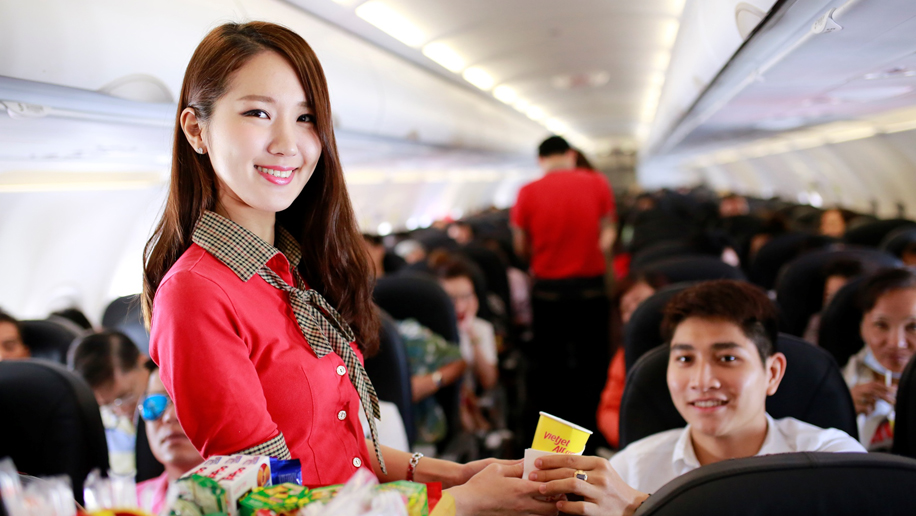Vietjet is exploring new ways to squeeze additional cash from passengers that doesn’t come from their airline tickets or in-cabin purchases, a member of the Vietnamese low-cost airline’s board has told an industry conference.
“We’re looking to generate additional ancillary revenues that extend beyond the cabin,” said Donal Boylan, a non-executive director at Vietjet, during an on-stage interview in Hong Kong on Wednesday.
Boylan pointed to the airline’s recent partnership with ride-sharing app Grab, which took over Uber’s Southeast Asian operations in 2018, as a good example of this. In August, Vietjet signed a memorandum of understanding (MoU) with Grab and local start-up Swift247 to connect flights with road transportation.
“Grab is an important partnership for us in terms of its access to customers, its ability to sell tickets and give end to end travel and pick someone up at the door of their home and bring them to the door of their destination in Singapore and Indonesia,” Boylan said.
He did not name any specific new ways that Vietjet would generate ancillary revenue, nor did he name any companies with which Vietjet is considering partnering.
Low-cost airlines price their tickets low in order to attract price-conscious travellers and often rely more heavily on ancillary revenues, such as from in-flight food purchases, than full-service carriers.
On a separate note, Boylan also said Vietjet is paying careful attention to how it brands itself when entering new markets.
“We’ve pretty much gone out there with a red flag and a gold star,” he said, referring to Vietjet’s livery inspired by Vietnam’s national flag.
“There are a lot of benefits in that Vietjet brand, but we also have to figure out how we manage that as we develop business in Japan, China – the core markets for us,” he said, without giving specifics on how exactly the airline might adapt its livery or branding for new markets.
737 Max impact
Business Traveller Asia-Pacific reported today on the comments of an aircraft leasing company executive who said Boeing’s troubled 737 Max would be the “safest aircraft in the world” when it returns to service.
Vietjet’s has an order for 200 B737 Max aircraft. The airline ordered the first 100 in May 2016 in a deal signed during then-US President Barack Obama’s visit to the Vietnamese capital Hanoi. Later, in February 2019, Vietjet placed an order for an additional 100 B737 Max aircraft, less than a month before Ethiopian Airlines Flight 302 crashed shortly after takeoff killing 157 people. This was the second fatal accident involving the Max in less than five months.
Vietjet’s Boylan said that not only the issues with the Max have had a “huge impact” on his airline, but the carrier is suffering from delivery delays of the Airbus A321neo over supply chain issues – as are other airlines around the globe.
“The issue we have currently is we don’t have the luxury of a Lion Air or Indigo of keeping our NGs or Ceos in service…every aircraft for us is a brand new aircraft,” he said, referring to the older Boeing 737 NG model that preceded the new-generation Max, as well as the older A320 aircraft that preceded the new-generation A320neos.
“Essentially, our Airbus deliveries are around six or seven months late. We were due to deliver originally 14 A321neos in 2019. We will only deliver six. We’ve a fairly similar pattern for next year and that’s created a lag on our product development in terms of new routes and opportunities.”
Boylan added: “On the Max side, it’s a little more complex. We were scheduled to deliver 28 aircraft beginning this month – two a month – right through to the end of 2020 – 28 aircraft…Certainly, we need 10-15 of those Max aircraft at a minimum. That’s without opening up another [overseas] franchise.
“We have two franchises now. Vietnam is the dominant one, and in Thailand we have an operation with 10 aircraft [Thai Vietjet Air] which is scheduled to double to 20 aircraft next year. The long and short version of this is we probably need to grow by 30 aircraft to meet our programme for the next 15 months, and at this stage we only have line of sight – firm line of sight, excluding Max – on 14 aircraft.
“Where things sit, there’s a lot of uncertainty, clearly: Boeing is unable to firmly commit to any customer.”
A321XLR
Boylan’s comments came the day before Vietjet announced an order for 20 latest generation A321XLR aircraft, making Vietjet one of the first carriers in the world to operate Airbus’ newest “extra-long-range” version when the first of the aircraft are delivered in 2023. The aircraft has a range of up 8,700km.
“Following the signing of this contract today, the new A321XLR will be the perfect upgrade to comprehensively modernise Vietjet’s fleet as we look to strongly grow international flight network. It’s exciting to know that our passengers will soon enjoy flying on our comfortable, modern and cost-saving mid-haul flights,” said Vietjet’s CEO Nguyen Thi Phuong Thao.
With this latest contract, Vietjet’s total order book with Airbus reaches 186 aircraft with the first A321XLRs to be delivered to the airline from 2023.


